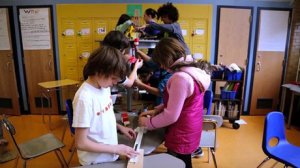Reframing Failure as Iteration Allows Students to Thrive
At New York City’s game-based learning school Quest to Learn, sixth graders take risks in the process of designing a Rube Goldberg machine, which enables more creativity, innovation, and engagement.
Your content has been saved!
Go to My Saved Content.What if instruction could actually engage students and get them excited about learning? What if school could foster student creativity and support their expanding imaginations? What if educators around the world had the tools to provide students with the 21st century skills to imagine and create their own futures in our ever-changing global society?
Education innovation is in full creative flower at Quest to Learn, a New York City public middle and high school. As the Guidance Counselor and Wellness Coordinator, I support the groundbreaking and effective teaching and learning that takes place here, nurturing social and emotional learning (SEL) as well as 21st century skills like inventiveness, risk taking and collaboration.
Developed in partnership with non-profit design studio Institute of Play, Quest to Learn has used research in game-based learning to create a rigorous and engaging collaborative learning space where students feel safe taking risks and using their successes and failures to create and apply new knowledge. Q2L students succeed academically not just because they are learning from teachers, but because they are learning from each other and, more importantly, taking charge of their own learning.

Standards and skills give students the tools to be active participants in their own learning. The application of acquired knowledge in a creative space keeps them engaged and empowers them to take ownership of their learning. At Q2L, one of our best creative learning spaces is known as Boss Level.
Welcome to the Machine
Boss Level is an informal creative learning structure where students create and execute a complex project that requires them to apply the knowledge they have gained over a trimester. They incorporate skills and concepts related to Common Core, SEL and 21st Century Skills areas, which creates opportunities for teachers to assess some otherwise difficult-to-assess skills. For two weeks at the end of every trimester, normal classes are suspended while the whole school participates in the Boss Level design challenge, and students effectively become experts, teachers and learners in a complex problem-solving space.
Boss Level challenges vary for each grade, based on content and skills emphasized through the previous trimester. As new members of the school community, sixth graders participate in a Boss Level design challenge that tests not only their academic knowledge, but also their teamwork and creative problem-solving skills. In Decembers past, sixth grade students have been tasked to build a Rube Goldberg machine -- a complex system made up of several parts that can successfully complete a simple task. To foster collaboration and teambuilding, sixth grade students experience Boss Level in advisory groups known as Home Base, small groups of 12-15 students that meet with an advisor four times a week throughout the year to work on SEL skills.
In week one of the sixth grade Boss Level, students participate in electives or "strands" that provide them with the tools to work collaboratively to build a machine. For example, a teamwork strand teaches students the components of successful collaboration and allows them to playtest and assess their group work skills, creating norms around working together. In week two, they start designing and building. The Rube Goldberg project culminates in a presentation of machines, attended by the broader school community including family, friends and "celebrity" guest judges. Home Bases are judged on various academic criteria and are acknowledged for overall success of the machine, creativity and teamwork.
From Learner to Leader
Academically, the Rube Goldberg challenge speaks to the science concepts learned from September through December. Each Home Base's machine must include simple components such as inclined planes, wheels and axles, levers and pulleys. SEL and 21st century skills learned throughout the trimester are also assessed throughout the building phase. Home Bases must work together, learn to receive and implement feedback, and self-regulate emotions.
The term "Boss Level," by definition, is the culminating challenge in a video game where the player must use all the skills he or she has acquired to solve the complex problem ahead, or "beat the Boss." At Quest to Learn, Boss Level is more about "being the boss," as it signals a clear transition from learner to leader. This is the point at which students take the figurative wheel of the classroom and demonstrate all they've learned by creating, testing, iterating and completing one comprehensive and creative embedded assessment.
As a member of our sixth grade staff, I am rewarded every year with seeing Boss Level come to life in all the Home Bases. Students who are introverted and soft-spoken find their voice in creating and contributing ideas. Headstrong and over-eager students learn through practice that part of being a leader is allowing others to lead. Most importantly, groups of students who normally would not gravitate towards each other build relationships with one another and leave the project sharing a major academic success.
Creating a Boss Level-style project in your own classroom requires a little creative planning, a lot of building materials, and the willingness to stand back and let the students take control with an often-chaotic design process. But it will leave you with one of the most rewarding feelings as an educator -- being able to let go of the reins and watch your students take ownership of what you have taught them as they bring it to life through applied creativity, collaboration and problem-solving skills.
How have you seen your students flower with these 21st century skills?